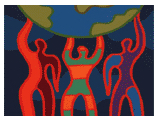
these are NOT official Open University Web pages
My experience as a student in
 |
|
 |
|
Development Studies:
Human, Community,
Institutional, Environmental |
TU874: Theater as a Tool for Development/
Theatre as a Tool for Development
(Public health, awareness-building,
conflict resolution, behavior-change, etc.)
For my Master's Degree in Development Management at Open
University, (the degree is, as of 2021, called Global
Development) my last course was TU874 The Development Management
Project, completed in October 2005. This course involved my
researching a development-related topic of my choice, and producing a
10,000 word paper as a result of this research. TU874 represents just
one-sixth of OU's MSc Development Management program; as the final project
involves only around 240 hours of study, it cannot be equated with an MA
by thesis. Hence why my final project is not as long, nor does it read, as
a traditional thesis.
My research project was an investigation of what elements need
to be in place before an organization produces a live, in-person
performance, or series of performances, as a development tool, excluding
performer training and theater techniques. Research focused on the
experiences of people and organizations who have used live, in-person
performance as a development tool (theater for development, or TfD). The
goal was to identify the systems and atmosphere that need to be cultivated
in order to ensure the success of a TfD initiative and to tie these to the
concepts taught in OU Development Management courses.
There are numerous organizations using theater techniques as part of
their development activities, and there are also numerous initiatives,
publications, web sites and individuals that promote and chronicle
successes regarding live, in-person performance as an effective tool for
development. Even in our current age saturated with multi-media, live,
in-person performance/TfD is a popular and effective tool for education,
outreach and capacity-building regarding a variety of development
issues, such as HIV/AIDS prevention, domestic violence, evolving gender
roles, or good sanitation practices.
However, there is little information on what has to be in place before
these techniques are used, excluding performer training, to better
ensure that these techniques will be well-received by an
audience/participants, and to better ensure that the desired outcomes
will be generated. There is a need for more information on how to
cultivate support for and trust in such an initiative among staff at the
lead agency, among partner organizations, and among those for whom the
theater-for-development techniques will be used.
This project included a review of key
literature on TfD, and semi-structured interviews with 12 TfD
practitioners.
You can read online:
Questionnaires and further information are NO LONGER BEING ACCEPTED. Thank
you to everyone who helped.
This investigation portion of this process is now over. The paper has
been submitted to Open University. A version of the paper will be created
for submission to a development-related journal. If the paper is
published, I will post information about what journal it will appear in
here.
WHY "THEATER FOR DEVELOPMENT" AS MY TOPIC?
Those of you who know me were all expecting me to do something regarding
either volunteerism, specifically online
volunteering or the vital role
volunteers play in community technology initiatives, or mission-based
organizations and technology, as that's been the focus of my
professional work for most of the last 15 years. Well... surprise!
Live, in-person theater has always been a love of mine: I was always
involved in theater in some way during junior high, high school and then
my undergrad at university, and for five
years, I worked in public relations and marketing at various professional
theaters, including the Tony-Award winning Hartford Stage and the
internationally-acclaimed Williamstown Theater Festival. The power of
theater to reach people, particularly in this era of high-technology
saturation, fascinates me. There is nothing like it, no experience that
matches it. Writing my Master's Degree final project on a theater-related
topic was my opportunity to get back in touch with something that started
me off professionally, and something I believe in personally.
BIAS
Ofcourse I'm biased. Every researcher is. There is no such thing as a
completely neutral research survey, nor completely neutral researcher. One
of the reasons I have posted so much information on this web site is to be
up front about my agenda in this project, as well as transparent on what
my methodology is. I have appreciated very much the helpful critiques and
suggestions I have received from TfD practitioners, which I think will
help to create a project they can actually use in their own work, as
opposed to doing something that merely gets me what I need to attain a
Master's Degree.
DISCARDED TOPICS - THEATER RELATED
Possibility #1: I considered focusing on theater being used as a
tool for development in just one geographic area that is dominated by
developing countries: Africa, Central and South America, countries that
were formerly part of the Soviet Union, or developing nations in Asia. But
it has proven too difficult to identify enough initiatives in one
geographic area, other than in North America, to undertake the necessary
research in such a short time frame, and too difficult to get enough
people in one geographic area to respond to my emails.
Possibility #2: I considered focusing on theater being used in
just one of the following development activities in any country
(and probably several different countries):
domestic violence education
HIV/AIDS education
workers rights education
healthy living education
sanitation practices education
gender issues education
human rights education
vaccination education
women's issues
But, again, it has proven too difficult to identify enough initiatives in
just one area of development to undertake the necessary research in such a
short time frame, and to find enough people in this limited area willing to
share information.
DISCARDED TOPICS - OTHER
You can view a list of topics I was
considering for my research project outside of theater, and I'm
happy to share the resources I had found on these topics with others.
Also see:
Back to my development resources main page
Quick
Links
 my home page
my home page
 my consulting services
& my workshops & presentations
my consulting services
& my workshops & presentations
 my credentials & expertise
my credentials & expertise
 my research projects
my research projects
 my book: The Last
Virtual Volunteering Guidebook
my book: The Last
Virtual Volunteering Guidebook
 How to Support This Web Site & My Work
How to Support This Web Site & My Work
 contact me or see
my schedule
contact me or see
my schedule
 Free Resources:
Community Outreach, With & Without Tech
Free Resources:
Community Outreach, With & Without Tech
Free Resources:
Nonprofit, NGO & other mission-based management resources
 Free Resources: Technology
Tips for Non-Techies
Free Resources: Technology
Tips for Non-Techies
 Free Resources: Web
Development, Maintenance, Marketing for non-Web designers
Free Resources: Web
Development, Maintenance, Marketing for non-Web designers
 Free Resources: For
people & groups that want to volunteer
Free Resources: For
people & groups that want to volunteer
 linking to or from my web site
linking to or from my web site
 Coyote Helps Foundation
Coyote Helps Foundation
 me on social media (follow me,
like me, put me in a circle, subscribe to my newsletter)
me on social media (follow me,
like me, put me in a circle, subscribe to my newsletter)
 how to support my work & this
web site
how to support my work & this
web site



Disclaimer: No guarantee of accuracy or suitability is made by the
poster/distributor. This material is provided as is, with no expressed
or implied warranty.
See this web site's privacy policy.
Permission is granted to copy, present and/or distribute a limited
amount of material from my web site without charge if the
information is kept intact and without alteration, and is credited to:

Otherwise, please contact me for
permission to reprint, present or distribute these materials (for
instance, in a class or book or online event for which you intend to
charge).
The art work and material on this site
was created and is copyrighted 1996-2020
by Jayne Cravens, all rights reserved
(unless noted otherwise, or the art comes from a link to another web
site).



 my home page
my home page